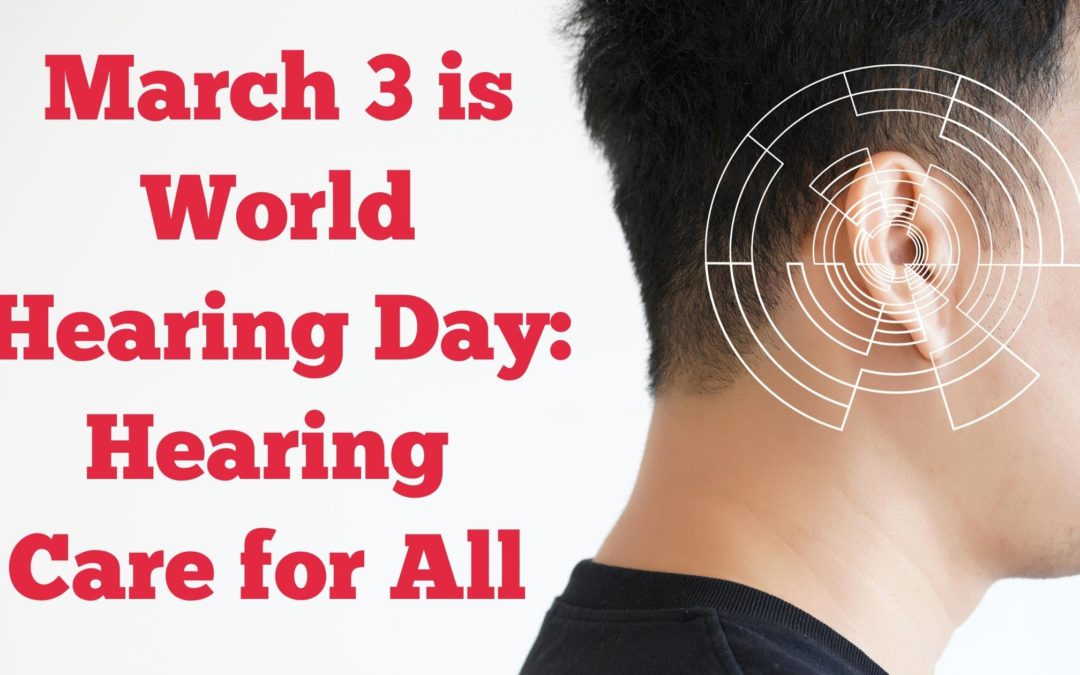As with many aspects of social life, global disparities affect access to hearing care. Although rates of hearing loss treatment in developed nations remain far below the total population of people with hearing loss, these rates are higher than those in developing nations. With this disparity in mind, the World Health Organization has instituted the theme “Hearing Care for ALL!” for this year’s World Hearing Day on March 3rd.
As we celebrate the role of hearing health in our lives, we can be sure that access to hearing health care needs to be expanded globally. Advocating for expanded access can happen in a number of ways. In the first case, governments can take steps toward expanded hearing health care. In addition, communities can support members who need hearing health care. Finally, individuals can take the steps toward getting the hearing care they need. Why not choose to celebrate this year’s World Hearing Day with advocacy in one or more of these domains?
Government Action
When it comes to expanded hearing health care, policymakers in top government positions can make changes that affect everyone. One of the most important points of advocacy among policymakers is to urge them to close the gap between the population with hearing loss and the population who receive care for that hearing loss.
This chasm is too wide, and those in top positions have the power to move the untreated into the category of treatment. One way to do so is to reduce the individual cost of hearing loss treatment. By providing funds for hearing loss diagnosis and the purchase price of hearing aids, governments can make it possible to access care even in the remotest regions.
In addition, governments can make changes to technology that have enormous implications for ongoing hearing damage. Specifically, technology companies have the responsibility to set maximum volume levels on audio devices, but too many devices stretch into the range of hearing damage. Governments can mandate that these maximum volumes remain at a lower level where fewer people will experience damage to their sensitive hearing.
Community Support
Expanding access to hearing care can happen at the community level, as well. Our senior centers, nursing homes, and other community venues come in contact with people who are likely to have hearing loss. Through public awareness campaigns, these organizations can help expand access to care. As well, these groups can host testing events that make it easier to access a hearing test. Some audiologists and hearing health professionals offer mobile hearing tests, so these community centers are a perfect location for this type of engagement.
Individual Practices
At the individual level, we can get in the practice of engaging with hearing health care. Whether that means scheduling your first hearing test or getting an update to the test you had so long ago, accurate diagnosis is crucial to the treatment process. As well as your own hearing health, you can look out for those closest to you, including your family members, loved ones, friends, and neighbors. These connections can pave the way toward hearing care access that might otherwise go unmet.
In addition to getting hearing tests, it is crucial to practice hearing protection in our own lives. When your hearing is at risk of damage, only you are responsible for getting and wearing the protection you need. Though workplaces and other organizations are mandated to supply protection and to enforce its use, too many workers shirk these responsibilities. Wearing the appropriate protection is a necessary step you can take toward your future hearing health. In addition, limiting the volume and duration of use of portable audio devices, including earbuds, is a wise choice.
Though these devices are easily woven into our lives, they come at a cost to our hearing ability. Finally, when the time comes, you can take the step toward accessing and using hearing aids. These devices not only improve your hearing and communication ability, but also they are connected to improved health in other domains.
If you have experienced changes in your hearing, contact us today! We provide comprehensive hearing health services and we look forward to supporting you on your journey to better hearing.


